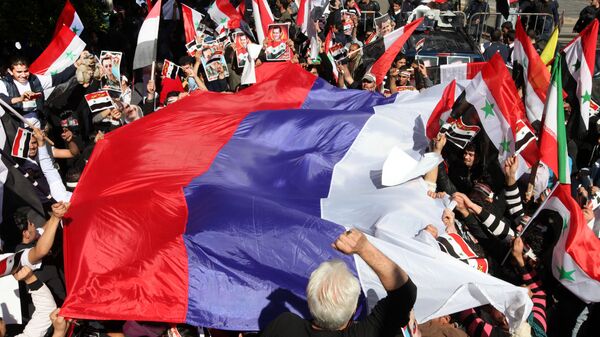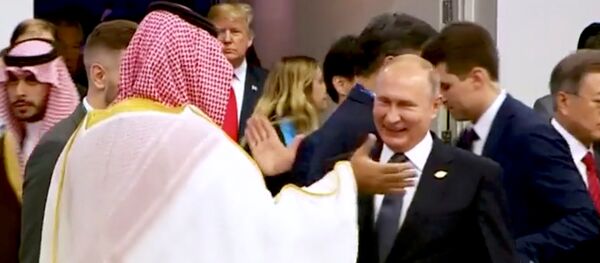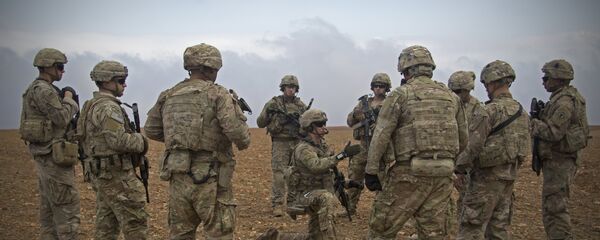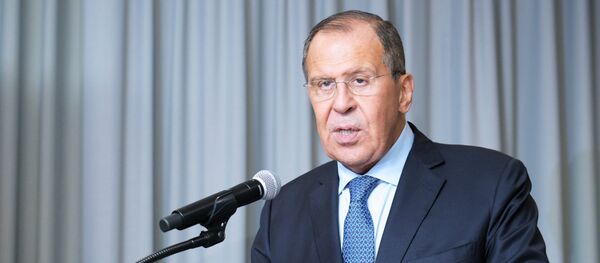Moscow to Keep Playing Leading Role in Syria, Focus on Political Process
Russia’s role in Middle Eastern affairs, particularly Syrian settlement, will continue to grow this year due to the country’s previous successes in Syria, Vladimir Fitin, a Middle East expert at the Russian Institute of Strategic Studies, told Sputnik.
"As the last year showed — and this trend, I think, will continue this year — the influence of Russia and its importance in the Middle Eastern region will increase since the events in Syria have already demonstrated this. Russia's role there is one of key ones, and its actions in this country has led to a drastic change in the situation and the restoration of the rule of the legitimate government in more than two-thirds of the country’s territory," Fitin said.
READ MORE: US Wants to Accuse Russia of Helping Daesh — Moscow
Ruslan Mamedov, a Middle East expert at the Russian International Affairs Council, echoed this sentiment in his comments to Sputnik by highlighting the importance of Moscow’s role in the Syrian peace process.
"A political settlement in Syria is impossible without Moscow. This is a fact that everyone understands," Mamedov said.
The expert noted, however, that the withdrawal of US troops from Syria, announced by US President Donald Trump in December, would not ultimately lead to Russia’s increased role in the region, but rather give the floor to the Middle Eastern powers.
"I do not see the withdrawal of the United States from Syria as something extremely positive for Russia. Russia will need to invest more in regional affairs. Russia will suddenly realize that it will no longer be able to play on the contradictions between Washington and regional powers, simply because the US withdrawal will lead to an increase in the role of regional powers, but not to strengthen, roughly speaking, the role of Russia," he explained.
"Russia is now preparing for the next stage — bringing the regional, external actors to the political process, political settlement. No matter what conditions there will be for that. What is more important is the background — the ability and capability of certain factors to influence what will happen in and around Syria," the expert said.
Russia's Ties to the Mideast States to Grow Stronger
Russia will continue to enjoy good relations with the Middle Eastern countries in 2019, including with the region’s main opponents, Saudi Arabia and Iran, Fitin said.
"Practically all countries of the Middle East show an interest in interacting and cooperating with Russia, and even with those that are in extremely opposing relationships with each other, even in hostile ones. I mean, first of all, Saudi Arabia and Iran. Russia has fairly stable cooperation with both countries, and there is no reason to believe that it will not continue," the expert said.
READ MORE: Strategic Expert on US' Syria Pullout: Americans Will Transfer Troops to Iraq
Over the past year, Russia has signed an array of memorandums and contracts for rather ambitious projects with the countries of the Arabian Peninsula, in particular with Saudi Arabia. Discussions on Saudi Aramco’s possible participation in Novatek’s Arctic LNG 2 project, as well as Saudi investors’ multi-billion dollar investments in Russian projects made the headlines of leading international media outlets.
"If we speak purely about the Gulf States, Russia has established a very good partnership with all of them, and there are real opportunities for participation in the implementation of a number of projects both in Russia and in the Arab countries, as well as for attraction of relevant investments to Russia," Fitin said.
Russia's good relations with the Middle Eastern powers are also secured by close cooperation in nuclear power as it is the only country building nuclear power plants in the region, Mamedov pointed out. In particular, Moscow has been helping build Turkey's Akkuyu nuclear power plant (NPP), Egypt's Dabaa NPP and Iran’s Bushehr NPP.
"Russia is generally the first country to build nuclear power plants in the Middle East. No other country does this, it is our tool of soft power," the expert said.
One should not forget about yet another thing that Russia and most Middle Eastern countries have in common — oil. Cooperation with the regional states within the Organization of the Petroleum Exporting Countries (OPEC), which is likely to continue this year as well, will lead to further rapprochement between Moscow and Riyadh, according to Mamedov.
"I think that Saudi Arabia, the OPEC countries as a whole and Russia will continue to be interested in determining the necessary output levels in order to secure the price that will be profitable for oil economies. Nothing is likely to change here, but it [cooperation in the oil industry] will continue to bring the positions of Saudi Arabia and Russia closer," he said.
Nevertheless, Russia and Turkey have continued to cooperate in the defense industry this year, with the S-400 deal likely to go through despite pressure from the United States as Ankara pursues a policy that is independent from Washington, according to Mamedov.
"The United States, by allowing Turkey to acquire US [Patriot] systems, has attempted to force Turkey to abandon defense industry cooperation with Russia. But, de facto, the Turks are able to independently determine what and how they should do, everything will depend on the position of Ankara itself. Its current position is still that the S-400 deal will take place," he said.
In addition, the two countries have other areas of strategic cooperation such as the TurkStream gas pipeline and the above-mentioned Akkuyu NPP, the expert noted, adding that mutual interests and co-dependence enabled the two countries to resolve their disagreements.
"Based on the current situation, it appears that all these projects will be continued and implemented, despite any opposition from the United States. Apparently, they will all be completed on time. In general, the prospects for further bilateral economic cooperation are very real," Fitin said.
Moscow to Remain Key Actor in Afghan Settlement
The end of 2018 saw some significant steps being taken toward restoring peace in Afghanistan, which has long been destabilized by a conflict between the Taliban and government — the situation is only exacerbated by the activities of various terrorist groups in the country.
Russia will remain a key mediator in the further reconciliation process in 2019 due to its good relations with both the Afghan government and Taliban, Nikita Mendkovich, an expert at the Center for Modern Afghanistan Studies and the Russian International Affairs Council, told Sputnik.
"Russia's role in peacemaking will remain high, as it enjoys a certain trust of the pro-government forces and the armed opposition, which enables it to act as some sort of mediator. Previously, other states tried to act in this capacity, but they could not secure such positions," Mendkovich said.
According to the expert, the peace process, including talks mediated by Russia, will continue this year as there was no other alternative to end the years-long conflict.
"At the moment, the peace process has no alternative. Kabul and Washington suffer a series of military defeats in the country, the situation is constantly deteriorating, so, logically, if it is impossible to win a war, you need to talk about peace. And Russia offers this option, this opportunity," he noted.
Russia-China RElations, Economic Cooperation Deepening Over Years
Russia’s relations with China, its key partner in the Asia-Pacific region, are unlikely to experience drastic changes in any direction in 2019 as they are already at a very high level, a fact repeatedly reaffirmed by both leaders, according to Alexander Lomanov, Chief Research Fellow at the Primakov National Research Institute of World Economy and International Relations of the Russian Academy of Sciences and the Russian International Affairs Council expert.
"The specific nature of these relations is that they are very even, they are very stable and in fact, there cannot be any sharp changes for the better and for the worse," Lomanov told Sputnik.
READ MORE: US Established Two New Military Bases in Anbar Province — Reports
He explained that the overall dynamic in bilateral relations was positive because they had been gradually deepening over the years.
"Every year they [ties] get stronger, covering more and more areas, while the degree of mutual interest and mutual trust grows," Lomanov said.
Both countries are likely to further underline "bilateral friendship and cooperation" this year as it marks the 70th anniversary of the establishment of diplomatic relations between the two countries.
"This is not only 70 years of the founding of the People’s Republic of China, but also 70 years of diplomatic relations between the People’s Republic of China and the Soviet Union, which China perceives as the 70th anniversary of friendship with present-day Russia," the expert said.
According to Lomanov, there was a lot of potential to develop bilateral economic cooperation as well.
"The prospects are enormous, only for this you need, first, to get to know each other’s markets more deeply, to get to know each other’s needs more deeply and, accordingly, to trust each other more in the economic sphere," he said.
The expert pointed out, however, that whereas the two countries had strong political trust, there was a lack of so-called "economic trust" between businessmen and bankers who "refuse to cooperate with the other side because of fears of some kind of punitive measures from the United States."
"I hope that it is in this area that the efforts of both sides will be made in 2019 to strengthen mutual economic trust," Lomanov said.
Low Chances for Breakthroughs on Russia-Japan Peace Treaty
Moscow hosted the first round of these negotiations between the Russian and Japanese foreign ministers earlier this week, while the two leaders will discuss the matter next Tuesday during Abe’s visit to Russia.
Nevertheless, Russia and Japan still have low chances of achieving any significant progress on the peace treaty this year, Vladimir Nelidov, a research fellow at the Center for Japanese Studies at the Institute of Far Eastern Studies of the Russian Academy of Sciences and the Russian International Affairs Council expert, told Sputnik.
"Those who thought that there would be a breakthrough soon are going to be disappointed. Even if the leaders wanted to achieve such a breakthrough, then for domestic political reasons, neither the Russian leader nor the Japanese leader would be able to do it," he said.
READ MORE: US Presence ‘Creates Obstacles' to Stability, Won't Defeat Daesh — Diplomat
The expert stressed that the prospects for a peace treaty were overshadowed by the two countries’ historically opposing views on the four Southern Kuril Islands — Iturup, Kunashir, Shikotan and Habomai — that are claimed by both countries.
"Abe’s expectations — it’s not clear whether he actually believes that something could be achieved now — these declared expectations for some kind of breakthrough are most likely not come true because of huge differences between the positions of Russia and Japan not even on the issue of peace treaty — both sides agree that it is necessary to conclude it — but on the prerequisites and conditions for concluding this peace treaty," Nelidov pointed out.
There was some "positive dynamic" in bilateral economic relations due to an increase in mutual trade, he stated, noting, however, that any "drastic improvements" in terms of the economy were unlikely either.
Views and opinions expressed in this article are those of the contributors and do not necessarily reflect those of Sputnik.







